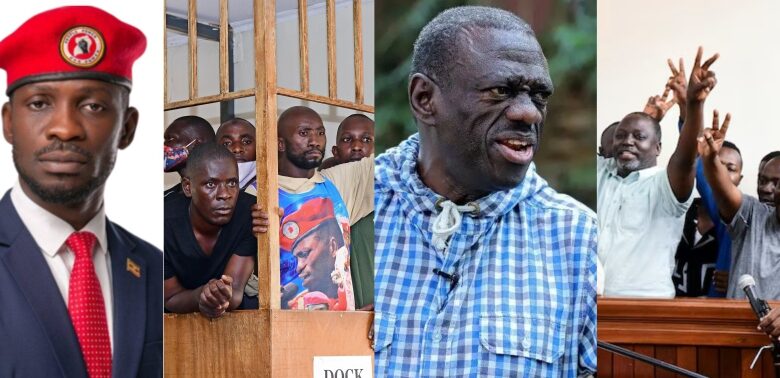How political leaders dance free while supporters rot in jail
Time and again, sounding leaders of opposition political parties like Bobi Wine and Dr. Kizza Besigye, who rally their followers to the streets in protest, find themselves behind bars, only to be swiftly released.

In the shadow corridors of Ugandan politics, a disturbing pattern has emerged—one that raises questions about the price of loyalty and the true cost of political dissent among political leaders.
Time and again, sounding leaders of opposition political parties like Robert Kyagulanyi Sentamu and Dr. Kizza Besigye, who rally their followers to the streets in protest, find themselves behind bars, only to be swiftly released.
But for their ardent supporters, the story is far grimmer, as they often face lengthy and unjust imprisonments while these political leaders walk free.
These protests, sparked by political grievances and calls for reform, draw large crowds eager to challenge the status quo.
Yet, when the police swoop in to quell the unrest, it’s the rank-and-file protesters who pay the heaviest price. They are arrested all together, tried on dubious charges, and frequently left to languish in overcrowded prisons for years.
Meanwhile, the leaders they so fervently support—those who stand at the helm of these movements—are released in mere days or weeks, returning to their lives, their families, and their political platforms.
Take the case of Bobi Wine, the charismatic pop star turned politician, who has become a symbol of resistance for many Ugandans. His arrests have made headlines globally, but his swift releases often follow.
His supporters, however, are not as fortunate. Many remain behind bars, forgotten by the media and, at times, even by the movements they helped propel.
Dr. Kizza Besigye, a seasoned veteran of Uganda’s political opposition, shares a similar story. Over the years while his Forum for Democratic Change (FDC), his repeated arrests became almost ritualistic—a predictable cycle of capture and release.
Yet, the same cannot be said for the hundreds of supporters who have stood by him, many of whom have faced years of incarceration without the same legal recourse or public attention.
This troubling reality highlights a stark disparity in Uganda’s political landscape: while leaders might navigate the stormy seas of opposition with relative ease, their followers are often left to drown.
The very system these leaders fight against appears to recognize their political value, treating them more leniently while punishing their supporters as a warning to others.
Dr. Amina Okello, a renowned Ugandan political analyst and human rights advocate, provides insight into this troubling dynamic.
She explains, “This selective repression is a classic tactic used by authoritarian regimes to maintain control. By targeting opposition leaders briefly, they neutralize their ability to organize while allowing them to continue to inspire from outside.”
Meanwhile, imprisoning grassroots supporters according to Okello, serves to instill fear and discourage widespread dissent.
“This divide-and-conquer strategy effectively weakens the opposition by fracturing its base and dissuading active participation in protests.” she added.
In the end, these dynamics raise uncomfortable questions. Is it the price of political leadership in Uganda, or a calculated strategy by those in power to dissuade future dissent?
And for those willing to march behind these leaders, is the risk worth the reward, knowing that their loyalty could lead them to a prison cell while the leaders they admire continue the fight from the outside?
As the cycle of protest, arrest, and release continues, Uganda’s political future remains uncertain. But one thing is clear: in this game of dirty politics, it’s the supporters who are paying the ultimate price.







